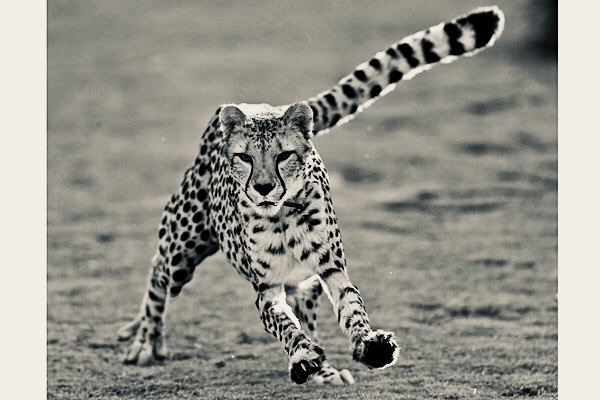I fell in love.
With cheetahs.
I was on the other side of a painful break up with a cherished love and in active grieving mode. During times like these, wemay crawl into a pint of Haagan Daz, or cradle a wine bottle, or burrow into someone else’s arms for comfort.
This time around, though, I poured over National Geographic video clippings on this matriarchal loner animal’s preying instincts and commitment to family and survival and how we can learn to our conserve energy from them(https://www.jonathanfoust.com/).
I am a single mother concerned with raising my three sons in this unpredictable and sometimes chaotic 21st century terrain, and always looking for ways to be more mindful of my daily actions.
Faster than Hussein Bolt, cheetahs reach speeds of 45 mph in 2.5 seconds and sustain their top speed of 64 mph for a brief time (www.livescience.com). Their mindful attention to their environment is captivating and helped by the “tear drops” that run from the corner of their eyes down to the edges of their mouths, to help block the sun when they are hunting.
They scan the terrain to see what is relevant. For their attention is not haphazard. Cheetahs sustain their focus for hours. They know exactly what they need and will keep looking until they find it.
How many of us can say that we know what we want and stay mindful long enough to spot it, and then go after it, unabashedly, at full speed?
The question is “What do you want?”
Simplistic in its essence yet so often we feel stunned and caught off guard, like a deer caught in headlights, when asked. Our needs and wants can also be called our intentions; which may leave us feeling even more confused.
But see, once we know what we want or what our intention is, the riff raff, the distraction, the fluff, falls away. And we are left we the conscientious choice of how we choose to live our lives.
The Importance of Intentions
There are three components to intention setting that contribute to our living mindfully.
Intention setting allows us to direct our own path by determining where we place our focus. Like the cheetah roaming the high African dessert, we survey our environment for what may contribute to our quality of life. For example, if I were to “scan” my life to find what is most distressing right now it would be the frequent arguing with my teen sons. So, I have recently made it a daily intention for me to communicate with more empathy,patience, and nonreactivity, in order to increase my quality of life.
Second, intention setting helps us exercise our free will, our ability to pause and make a conscientious choice, and reduce habitual responding. For example, I may have an intention to be less argumentative with my teen boys and yet once again I may find myself in a heated discussion with one of them. I start to feel the beginnings of tension in my chest and frustration and defensiveness building in my emotions and thoughts. Then, I pause and remember my intention and make the choice to practice understanding and empathy in that moment, rather than the habitual response of judgment and defensiveness. Intentions can be compassionate and self-caring.
We do not waste our time and energy with things that do not relate to our intention. It is like an anchor that keeps us grounded in our truth and our goals, not getting pulled in other irrelevant directions by temporary emotional shifts and external distractions. I heard a yoga teacher once say, “use only the muscles that you need and relax the ones you don’t.”
Simple, brilliant, not easy.
With each pose or situation in life, it requires astute attention to what we are doing in the moment and recruiting within ourselves only that which we need to accomplish the task, conserving energy, increasing efficiency, and reducing futility. I may realize that arguing with my son is futile and energy depleting. The only “muscles” I need to use in that moment are understanding and empathy. Not easy, for sure. So, like any muscle we are strengthen, we give it time.
Patience is key.
If you watch a cheetah running at full speed towards their prey, they are all in and totally committed to the pursuit; no second-guessing or doubting. And, at the same time, they will “stop on a dime” like “skidding” on their hind legs, the millisecond they realize their chase will not be successful.
How many times have we gone back to something that was not in our best interest, only to reassure ourselves that “maybe this time it will be different?” Or, “If I try harder or change myself or do it this way, then the outcome will be different?”
Like the cheetah, when we are mindful of our true intention, we have the wisdom to discern what is in our best interest and cultivate the ability to let go of the things, jobs, relationships, people, and behaviors, that no longer benefit us. We stop or skid, and no longer draw out the pursuit, to a slow, exhaustive, soul crushing crawl because we know it will not benefit us. We conserve our precious energy for the next chase, for the next step towards our intention.
Intention setting brings us back to the here and now, the third component. I may have been mindlessly and habitual getting more and more reactive and frustrated at my sons because that is where these types of arguments tended to go; as if on auto-pilot, pulling me further away from the moment and what was happening and needed from me. It may not have been until I heard my own raised voice that I had the awareness to know I am no longer abiding by my intention, and that I am expending a lot of my energy on an outcome that is unbeneficial.
It is never too late to pause, mind our intention and then make a conscientiousness choice. We can always begin, again.
Again and again, infinitum.
Strengthening the muscle of intention means repetition, which means resiliency, the ability to bounce back and keep going after a failure or setback; again and again, infinitum.
Cheetahs have a success rate of 58%. Not very high. A Serengeti study (https://www.discoverwildlife.com/animal-facts/mammals/hunting-success-rates-how-predators-compare/) found that out of 192 total pursuits by cheetahs, 114 were successful. We might say their motto is “try again.” Their survival depends on it. Our quality of our own lives depends on our resiliency.
Never give up. And, like the cheetah, the more we try, the more successful we will be at living our true intention.
Cheetah’s spotted fur helps them camouflage and stay hidden from their prey increasing their chances of a surprise attack and kill. This is akin to a recent study (http://www.psych.nyu.edu/gollwitzer/09_Gollwitzer_Sheeran_Seifert_Michalski_When_Intentions.pdf) that showed we are more likely to achieve our intentions or goals if we kept them to ourselves.
Sharing our intentions with others is just enough to attach our identity to the goal and give a sense of enough satisfaction to decrease our motivation to follow through; also called “premature sense of completeness.”
We have all been there.
As Ben Franklin said, “Well done is better than well said.”


 Share on bsky
Share on bsky





Read 1 comment and reply